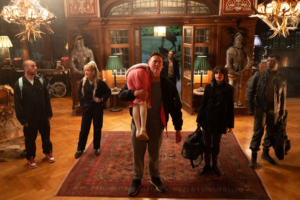Reviewed by GREG KING
Director: Lynne Ramsay
Stars: Joaquin Phoenix, Ekaterina Samsonov, Alex Minette, Judith Roberts, John Doman.
Glaswegian filmmaker Lynne Ramsay’s moody and grim films have always dealt with damaged characters (We Need To Talk About Kevin, etc) and difficult and confronting subject matter. Her fourth feature is no different.
You Were Never Really Here is based on the slim tome from Jonathan Ames (Bored To Death, etc), a twisted noir about Joe (Joaquin Phoenix, from Walk The Line, Gladiator, etc) a damaged former soldier and FBI agent who works as a gun for hire to rescue teenaged girls from sex slavery rings and trafficking. Joe also cares for his aged mother (Judith Roberts, from Eraserhead, etc) who is in the early stages of dementia. Joe also has suicidal thoughts as he suffers from PTSD brought on by the demons of his past – a childhood full of abuse and violence followed by his experiences in the military.
Joe’s handler John McCleary (John Doman, from Mystic River, etc) hires him to find the missing daughter (newcomer Ekaterina Samsonov, from The Ticket, etc) of a powerful New York senator (Alex Minette, from We Need To Talk About Kevin, etc). Joe soon finds himself caught up in a complex conspiracy involving some powerful, rich and corrupt men. He traces the missing girl to a high-end brothel that caters to the kinky and perverse tastes of some very powerful men.
Comparisons to Scorsese’s classic Taxi Driver will be inevitable, but Ramsay’s film is more of a dark character study rather than a conventional thriller. Ramsay visually conveys the sense of menace and the amoral tone of Ames’ novel with her impressionistic and non-linear narrative. Her screenplay is sparse and stripped back and her approach is economical, but the atmosphere of menace is pervasive and palpable. Ames’ novel was heavily influenced by the gritty pulp fiction novels of Richard Stark (a pseudonym of Donald E Westlake, author of Bank Shot, etc).
This is a propulsive and enigmatic thriller shot through with Ramsay’s signature art house stylings, which means it is not a film for action junkies or the usual fans of the thriller genre. Joe’s weapon of choice is a ball peen hammer, and a series of flashback sequences to his dark and troubled childhood explain the significance of this choice. Ramsay is working with her regular editor Joe Bini to incorporate these brief flashbacks into the narrative. Bini and Ramsay also avoid sensationalising the violence as much of its takes place offscreen.
The film has been shot by cinematographer Thomas Townend (Attack The Block, etc) whose moody visual style suits the tone of the material. The dimly lit action is reflective of Joe’s dark nature and the dark underworld that he inhabits. The film is accompanied by an ominous and moody and somewhat sad score from Radiohead guitarist Johnny Greenwood, who is better known for his work with Paul Thomas Anderson.
Joe is a taciturn sort and a bearded and muted Phoenix is given little in the way of dialogue. His enigmatic character is shaped by a more physical yet silent and expressive performance that relies on his facial expressions and body movements to convey the sense of his tortured psyche. His body bears the physical and psychological scars of his past. This compelling performance won Phoenix the coveted best actor prize at the Cannes film festival.
★★★



